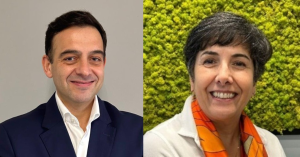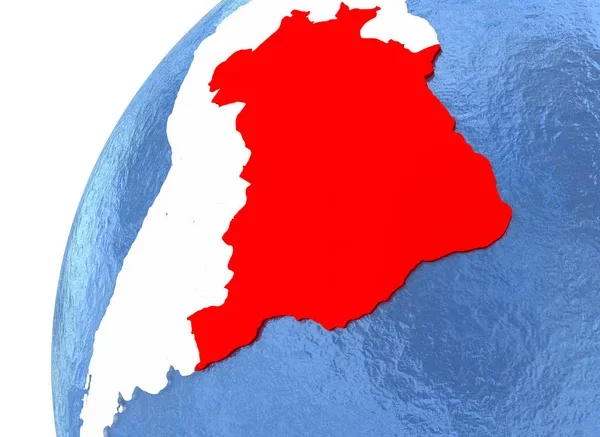“The Brazilian regulatory landscape is characterized by its peculiarities and complexities. Many of these characteristics arise from the tripartite federal system…”
Luis Claudio Perfeito Damasceno is the global head of regulatory and government affairs at UPL, graduated in biology from Mackenzie, with a postgraduate degree in plant protection from the Federal University of Viçosa and an MBA from Esalq/USP.
Rosa Maria de Sa Trevisan is the director of regulatory affairs for the Americas at Sipcam Oxon, with a degree in biological sciences from PUC, a specialization from Mackenzie and a M.Sc. in toxicology from Unicamp.

Luis Damasceno and Rosa Trevisan, experts in the pesticide regulation field
AgriBrasilis – Why do Brazilians stand out in the area of pesticide regulation?
Damasceno – The importance of agriculture to Brazil’s economy, its global prominence as a food exporting powerhouse, and the need for a robust regulatory system to ensure the safety and efficiency of these products. High-level academic training and the adaptability of Brazilian professionals are also crucial.
Trevisan – Brazil, as one of the largest food producers in the world, represents around 60% of the region’s business for pesticide companies. Given the dynamic and complex legal framework of the sector, these companies employ professionals in the regulatory area who work in Government Relations, pre-registration and post-registration activities and stewardship.
Operating in the Brazilian market is a great school; success requires the ability to navigate the technical, regulatory, legal and political landscapes. We do not have a specific training for this area in Brazil. We stand out by gaining experience along the way and developing resilience.
AgriBrasilis – What is your role in the field? What was your career trajectory and highlights?
Damasceno – I have been working in the pesticide regulatory area for almost three decades. I started as an intern at a regulatory consultancy and then moved to the industry in 2004, at Isagro SpA, an Italian company that was expanding into Latin America. During that time, I led regulatory and product development teams, registering products in more than 20 countries.
In 2009, I took over leadership of the Latin American regulatory team for an American company, Chemtura AgroSolutions. I decentralized the team to be closer to the regulatory authorities, which accelerated the product registration process. In 2012, I was hired by Bayer to transform the regulatory team for Brazil and part of Latin America. We achieved significant results, including the registration of a new molecule after an uncomfortable nine-year drought without registering anything new.
In 2018, I was assigned to the company’s headquarters in Germany to lead a global team in environmental product safety for three years. After that, I returned to the regulatory area to lead the global fungicides team, which was a unique experience. In 2023, I joined UPL as Global Head of Regulatory Science and Government Affairs, still based in Germany, focusing on efficiency, cost reduction, and effectiveness through the adoption of digital processes and tools to create a global, high-performance and international community spirit, spread across five continents.
Trevisan – Today, I work as the head of regulatory affairs for the Americas, leading the regulatory strategies for new projects of interest to the business, as well as the defense and maintenance of commercial products. The success in registering and defending molecules, as well as my contribution to the implementation of the risk assessment of pesticide use in Brazil, are important highlights in my career.
AgriBrasilis – What led you to work outside of Brazil?
Damasceno – The opportunity arose as part of a career development plan while I was still at Bayer. It was a great challenge to step out of my comfort zone and lead a global role at the company’s headquarters in Germany, facing a culture that was completely different from what I was used to. This has been an exceptional journey, in which I have been acquiring new knowledge and expanding my horizons, while sharing my accumulated experience in Brazil and Latin America. What was supposed to last 3 years turned into a journey of almost 8 years, enriching my life and that of my family through cultural and professional exchanges.
Trevisan – I always planned to work abroad, to broaden my horizons in the global regulatory field. I was blessed to be able to work in the USA, joining the global team of FMC Corporation for just over two years, interacting with Europe, Asia, and the Americas, and participating in international WHO/FAO/UNEP forums, discussing chemical safety practices. It was an incredible experience and I already knew that I would return to work abroad at some point. I returned and have been here for six years contributing to the international regulatory landscape.
AgriBrasilis – How was the transition from the Brazilian to the international regulatory environment?
Damasceno – The transition was smooth and enriching. The technical and people management principles are universal. Despite the challenges, Brazil has one of the most complex and robust regulatory systems in the world, which made it easier for me to adapt. Working closely with the team, traveling to different countries, understanding local opportunities and challenges, and talking to producers and authorities was essential.
Trevisan – In Brazil, I built the foundation for my skills and career, but it was only when I actually started working abroad that I realized that I still had a lot to learn. I then immersed myself in the different regulations and their nuances. I was privileged to have exceptional mentors, brilliant and welcoming people, who guided me along the way.
AgriBrasilis – Is the Brazilian scenario more complex?
Damasceno – The Brazilian regulatory landscape is characterized by some peculiarities and complexities. Many of these characteristics arise from the tripartite federal system, in which three agencies are responsible for analyzing and granting pesticide registrations. After obtaining federal registration, the product still needs to be registered in each of the States where it will be sold.
The complexity is compounded by the need for more investment in remuneration, exchanges and training, equipping regulatory bodies with enough professionals to meet the high demand. Brazil is the country with the longest pesticide registration process in the world, which does not benefit anyone.
These characteristics require a multifaceted and flexible regulatory approach. Furthermore, the constant evolution of international regulatory systems and the need for harmonization with other countries add further complexity to this issue.
Trevisan – Brazil has three agencies/bodies involved in the evaluation of pesticides, which creates procedural complexity and difficulties in alignment. Although we find similarities in some places, such as Europe, in OECD countries we have more complex scientific tools and requirements for the assessment of pesticide risks. The agencies in Brazil are slowly advancing in the use of these approaches, adapting them to Brazilian scenarios.
AgriBrasilis – What are the most relevant trends for the coming years?
Damasceno – In the coming years, the demand for safer and more sustainable products will drive innovations in formulations and application methods. Biological products will continue to gain prominence as a complement or alternative to chemical pesticides, with Brazil leading the regulatory transformation in this field. Biotechnology will remain crucial, and digitalization and advanced technologies, such as artificial intelligence, will transform pesticide monitoring, application and regulation.
Trevisan – The search for products with a lower impact on human and environmental health is relentless, along with the commitment to ensuring higher yields in agricultural production. The increase in the world population in the coming decades will challenge agricultural production, making it necessary to provide accessible technological alternatives to farmers. We must work together – the sector and public bodies – for more dynamic and agile regulation that adapts to market demands.
AgriBrasilis – Would you like to return to work in Brazil?
Damasceno – Yes, of course! I am very proud to have been born in a country that has immense agricultural potential. The opportunity to contribute to sustainable food production in a sustainable way, and to help preserve the incredible and unique biodiversity that we have in our country, is extremely motivating.
I believe that international experience can be valuable in facing local challenges and promoting the development of the regulatory area and innovative and sustainable solutions for Brazilian agriculture.
Trevisan – I don’t plan on returning at the moment. I really enjoy the work I’m doing here, but we never know what the future holds. There’s always a good chance, given the continued expansion of agriculture in Brazil.
READ MORE:

